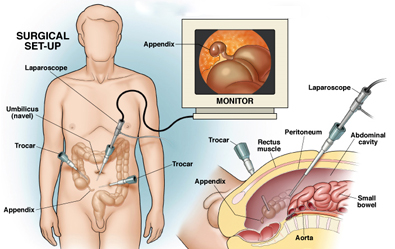Appendicitis is a painful swelling of the appendix. The appendix is a small, thin pouch about 5-10cm (2-4 inches) long. It's connected to the large intestine, where stools (faeces) are formed.
Nobody knows exactly why we have an appendix, but removing it isn't harmful.
Appendicitis typically starts with a pain in the middle of your tummy (abdomen) that may come and go.
Within hours, the pain travels to the lower right-hand side, where the appendix usually lies, and becomes constant and severe.
Pressing on this area, coughing, or walking may all make the pain worse. You may lose your appetite, feel sick, and occasionally experience diarrhoea.
Read more about the symptoms of appendicitis.

If you're experiencing abdominal pain that's gradually getting worse, contact your GP or local out-of-hours service immediately. If these options aren't available, call NHS 111 for advice.
You should call 999 for an ambulance if you have sudden pain that continues to get worse and spreads across your abdomen.
These are signs your appendix may have burst, which can lead to potentially life-threatening complications.
In most cases of appendicitis, the appendix needs to be surgically removed as soon as possible.
Removal of the appendix, known as an appendectomy or appendicectomy, is one of the most common operations in the UK and its success rate is excellent.
The operation is most commonly performed as keyhole surgery (laparoscopy), which involves making several small cuts in your abdomen, through which specialsurgical instruments are inserted.
Open surgery, where a larger, single cut is made in the abdomen, is usually carried out if the appendix has burst or access is more difficult.
Most people make a full recovery from an appendectomy in a couple of weeks, although strenuous activities may need to be avoided for up to six weeks after open surgery.
It's not exactly clear what the causes of appendicitis are. Most cases are thought to occur when something blocks the entrance of the appendix.
For example, a blockage may be formed by a small piece of faeces or an upper respiratory tract infection could lead to a swollen lymph node within the wall of the bowel.
This obstruction leads to the development of inflammation and swelling. The pressure caused by the swelling can then lead to the appendix bursting.
As the causes aren't fully understood, there's no guaranteed way of preventing appendicitis.
Appendicitis is a common condition. Around 40,000 people are admitted to hospital with appendicitis each year in England.
It's estimated around 1 in every 13 people develop it at some point in their life.
Appendicitis can develop at any age, but it's most common in young people aged from 10 to 20 years old.
© Dr. Parvinder S. Lubana. All rights reserved. | Developed & Design by ipromptsolution.com